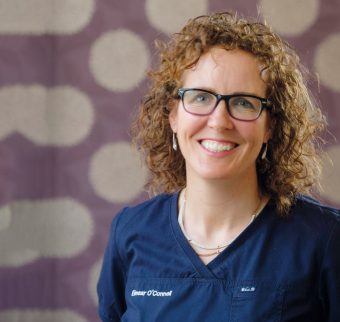Aiming to unite
President-elect of the ADI wants to increase access to education and inspire more women to get involved
Thinking about a career as she grew up, Eimear O’Connell was torn between teaching PE, engineering, and dentistry. “I thought about becoming a dentist because I woke up in bed when my granny hadn’t got her full dentures in place. It gave me a worse nightmare than the one I had had to make me seek solace beside her in the first place! It made me never want to end up in such a situation with my own mouth.”
After school in Coleraine, Eimear graduated from Edinburgh University in 1992. “Edinburgh was chosen primarily for the beauty of the city,” she recalled. “It had a good reputation for dentistry, but I fell in love with the city – Belfast, Newcastle and Manchester didn’t stand a chance after that!
“My first job was as a house officer, in conservative dentistry. I learned so much, but realised hospital work involved losing control of what happened in the long-term to patients, which didn’t suit my psyche. I then worked as an associate in an NHS practice in the city until 1995, when I set up my own practice, Bite Dentistry.
“At that point I realised how little I knew about running a business! In the early years it was very challenging,” she said. “But when you have great staff, the running the business part becomes easier – allowing me to focus on providing dentistry,” she said. The practice became fully private two years later, and Eimear has been working in the city ever since.
“My focus as a dentist has been primarily based on preventing people from losing their own teeth by educating them on how to properly maintain their teeth through oral hygiene and diet,” she said.
She has worked with the same group of support staff for 10 years and they have all completed advanced training in implant dentistry, radiography and sedation. In 2014, to celebrate 20 years in practice, Eimear took her team to New York for five days where they attended the Greater New York Dental Meeting and saw the sites.
Around five years ago, Eimear also became Scotland representative for the Association of Dental Implantology (ADI). “After spending 20 years managing my practice and bringing up my family, I decided I had to take a step forward to help women in dentistry and to show it is possible to manage both,” she said.
Like most representative organisations, there is a core membership who see real value; the challenge, said Eimear, is to motivate the rest to realise the benefits. The dental profession faces challenges and opportunities.
I woke up in bed when my granny hadn’t got her full dentures in place. It made me never want to end up in such a situation with my own mouth.”
“One of the main challenges is litigation against dentists,” she said. “The main opportunity comes with an ageing population, and people needing implants; with only 4 per cent marketing penetration this allows more scope for practice.” Increasing use of digital technologies will also support improved patient outcomes.
Eimear is leading the way for women in dentistry. She is the first woman to be president-elect of the ADI and works hard to promote women in dentistry. She received her MFGDP in and FFGDP from the Royal College of Surgeons London and her Diploma of Implant Dentistry from the Royal College of Surgeons Edinburgh; she was the first female dentist in the UK to gain an implant diploma from the RCSE.
Outside of dentistry, Eimear coaches and plays hockey and she loves sailing and skiing. She has three daughters, another reason why she is so passionate about helping women in dentistry.
Looking forward to presidency of the ADI, Eimear said: “The main aim is to try to unite our profession, increase access to education and inspire more women to get involved.” What more can the profession and wider society do to support more girls and young women into the profession?
“There is actually a 50/50 split between men and women at university level, so there isn’t necessarily a need for more women entering our profession,” observed Eimear. “The more important thing is to keep them engaged and work out what challenges they face to advancing on a career pathway.”

